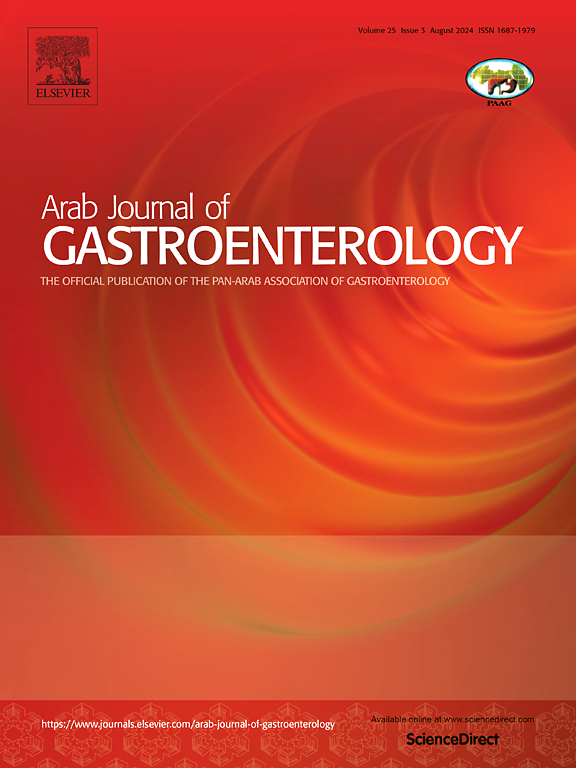Endoscopic characterization of gastrointestinal manifestations in children with undifferentiated recurrent fever
IF 1.1
4区 医学
Q4 GASTROENTEROLOGY & HEPATOLOGY
引用次数: 0
Abstract
Background and study aims
Systemic autoinflammatory diseases are characterized by recurrent or chronic inflammation, and monogenic forms are increasingly defined. However, a group of patients without genetic diagnosis is called the syndrome of undifferentiated recurrent fever (SURF). This study analyzed the clinical and endoscopic features of patients with SURF presenting with gastrointestinal (GI) symptoms.
Patients and methods
Between 2019 and 2022, GI endoscopy were performed in patients with SURF who presented with GI symptoms. Clinical, genetic, laboratory, and endoscopy findings were analyzed.
Results
Fifteen patients were included in the study, eight (53.3 %) were girls. The mean age was 10.5 ± 5.80 years, and the median age at symptom onset was 4 (0.3–16) years. All patients experienced fever and abdominal pain. Thirteen patients (86.7 %) experienced diarrhea, 11 (73.3 %) reported myalgia, and 10 (66.7 %) had joint involvement. Lymphoid follicles in the terminal ileum mucosa were detected in 10 patients (66.7 %), and nodular lymphoid hyperplasia in the terminal ileum was the histopathological finding in 12 patients (80 %).
Conclusions
The current study found that patients with SURF experiencing gastrointestinal symptoms have excessive lymph node formation in the terminal ileal mucosa due to an exaggerated inflammatory response. This may be the cause of their GI symptoms.
未分化复发性发热患儿胃肠道表现的内窥镜特征。
背景和研究目的:全身性自身炎症性疾病的特征是反复或慢性炎症,单基因型的疾病越来越多。然而,有一类患者没有基因诊断,被称为未分化复发性发热综合征(SURF)。本研究分析了出现胃肠道(GI)症状的SURF患者的临床和内窥镜特征:2019年至2022年间,对出现消化道症状的SURF患者进行了消化道内窥镜检查。对临床、遗传、实验室和内镜检查结果进行了分析:研究共纳入 15 名患者,其中 8 名(53.3%)为女孩。平均年龄为(10.5 ± 5.80)岁,发病年龄中位数为 4(0.3-16)岁。所有患者均有发热和腹痛症状。13名患者(86.7%)出现腹泻,11名患者(73.3%)出现肌痛,10名患者(66.7%)出现关节受累。10名患者(66.7%)的回肠末端粘膜发现淋巴滤泡,12名患者(80%)的回肠末端粘膜组织病理学发现结节状淋巴增生:本研究发现,出现胃肠道症状的 SURF 患者回肠末端黏膜淋巴结形成过多是由于炎症反应过度所致。这可能是他们出现胃肠道症状的原因。
本文章由计算机程序翻译,如有差异,请以英文原文为准。
求助全文
约1分钟内获得全文
求助全文
来源期刊

Arab Journal of Gastroenterology
Medicine-Gastroenterology
CiteScore
2.70
自引率
0.00%
发文量
52
期刊介绍:
Arab Journal of Gastroenterology (AJG) publishes different studies related to the digestive system. It aims to be the foremost scientific peer reviewed journal encompassing diverse studies related to the digestive system and its disorders, and serving the Pan-Arab and wider community working on gastrointestinal disorders.
 求助内容:
求助内容: 应助结果提醒方式:
应助结果提醒方式:


